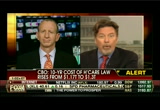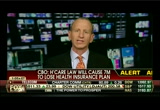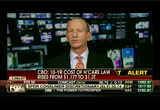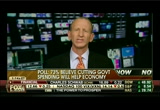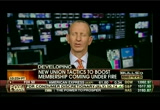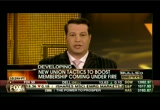tv Bulls and Bears FOX Business February 10, 2013 1:00am-1:30am EST
1:01 am
stay top of mind with customers? from deals that bring them in with an offer... to social media promotions that turn fans into customers... to events that engage and create buzz... to e-mails that keep loyal customers coming back, our easy-to-use tools will keep you in front of your customers. see what's right for you at constantcontact.com/try. >> . >> as the northeast is getting plowed out, nearly 7 million americans bracing to be pushed out from their health insurance. new government numbers showing that's how many people could lose their employer-based plans because of the president's health care law.
1:02 am
so what happens to this. >> if you like your health care plan you'll be able to keep your health care plan period. >> brenda: all this as the price tag keeps growing. someone here says the number of surprises will grow, too. are they right or wrong? i'm brenda buttner and this is bulls and bears. let's get right to it. the bulls and bears this week, we've got gary b smith, jonas max ferris, john layfield along with john tobacco and steve murphy. welcome, everybody. president obama expected to tout the health care law in his state of the union on tuesday, but john, you say this law isn't doing anything, but making america sicker? >> yeah, brenda. i mean, after years, literally the last three years, barack obama's been telling americans, you won't lose your doctor, if you like your health insurance, you can keep your health insurance, now post-election, surprise! 7 million americans, the numbers
1:03 am
are going higher. the cbo reports the dollars continue to go higher and really what it comes down to, we cannot afford this. small businesses can't afford to keep medicating their people and keeping them insured and at the end of the day this is just another sign of big government coming in with big plans that us, the taxpayers, just can't afford. >> well, steve, does it matter that we're losing employer-based health care plans, if more people are actually getting covered? >> yes, exactly. this plan is going to cover just about everybody. it makes me difference whether they get their health insurance through an employer or whether they get it through an exchange or some other way, through medicaid. as a matter of fact, having employer-based health care is bad for american business period. it hurts our international competitiveness. we would be better to move away from that system and replace it with something else, with guaranteed coverage for everybody. >> brenda: okay, john layfield, tell me what you think about that? >> i think free pizza for
1:04 am
everybody. let's just get the rich kids to pay for it, isn't that what the student council ran on this last election. >> the slice-- >> and the problem we have here is we did not have health reform, we had insurance reform. what john is talking about is right, we added 30 to 50 million people to the reform-- to the insurance rolls. we did nothing with health care. we pushed off the cough and all the things that are going to happen into this eltion cycle after the last election and we're starting to see this now. this is not free. >> brenda: in fact, cbo, which is nonpartisan says that debt will rise sharply relative to gdp after the health care plan is fully implemented. jonas, does that concern you? >> you know, it isn't going to raise that much because there are offsetting taxes to increase some costs and there's going to be increased costs and we've seen from the taxes and more taxes in a few years.
1:05 am
and it gets to the point, you know, the employer is-- the quote that's wrong from the president there in that reelection thing is, it's not your health insurance, you don't have health insurance, your company takes the health insurance plans for the employees and not yours to keep or take. if they want it kick you off because there are cheaper government plans, it exists because of the tax loophole and companies can buy you insurance and not have to pay tax on it as a salary. so, i don't think it's bad. in fact, it's one of the good effects of the affordable health care act and many others aren't as good so i think it will ultimately put more insurance in people's hands and they will be competitive. the notion you don't have to pay your own insurance bill is largely one of the health care cost ises rising and you don't see the bill and your company pays for the cost of it. >> gary b, the price tag is going up and we can't keep our employer-based health plans for many of us, what other surprises do you anticipate when this is fully implemented? >> well, i don't think it's
1:06 am
going to be any surprise to the obama administration. i think eventually, brenda, we'll all be under one government health plan. here is why. as john pointed out, the costs will be pushed more and more to people right now that can pay their insurance premiums. let's use me, i have blue cross, blue shield, my premiums will go up, they have gone up. and eventually, i'm just not going to keep paying higher premiums and i'll sign up for the government exchange. multiply me by 100 million people that are paying or whatever the number is and eventually we'll all concede and it will be like the borg and resistance is futile and the government will then clamp down on cost and doctors will have less incentive to enter the medical field. supply of medicine will decrease just like it has in the u.k. and get the u.k. system if you want to see a
1:07 am
gynecologist or specialist or something, you've got to wait six weeks and that's what will eventually happen. >> brenda: john. >> to gary's point perfectly, very quietly last week, post-election, the government announced that medicare had cut their subsidy of reimbursement for 4 million diabetic seniors where they reduced the reimbursement by 66% and they reduced the amount of companies that are allowed to supply these supplies from ove a thousand to 15. so the government created a quasi monopoly, an artifically low price and seems like they're cutting the costs to help pay for the stuff in obamacare, but what really is going to happen is what gary said. this is going to cut off people's access to the stuff ey really need and like gary said again, doctors at some point are just going to not
1:08 am
want to care for people, because it's not worth it. >> jonas, does that concern you? >> no, 'cause those, again, i think government care should be kind of on the crumby side to be perfectly honest the notice that everybody gets a $20,000 health care plan by that company, if you had lousy european plans, you have to wait eight months. those who want to buy insurance as a cadillac plan can and those who can't have to get the relatively affordable plan that the government or companies can afford, the stuff that everybody is in on the top dollar plan is not going to fly. >> you make a good point, jonas, when you have this kind of monopoly, if you will, there will be a private market, an underground market for people that are willing to pay a lot and then, that's, that's where you'll see the real entrepreneurship. for people that say, look, i'm not going to wait eight weeks to go see a specialist, i want to see a specialist tomorrow.
1:09 am
that will be the super premium gold-plated cadillac stuff available. >> steve, is that the right way to treat health care? >> first, it works the same way here now as the so-called, what you just-- gary b, what you just referred to as an underground black market, which is not a black market, it's free. >> these countries that everybody is trashing here, their health care systems cost half of much of gdp as our health care system does and they have better-- >> well. >> they have better results. and that's just straight up statistical analysis, and they have better results. why is that? i'm not-- >> first of all, they have better results because of many times how it's measured. like infant mortality. we save a lot more infants so we have a higher mortality rate. i don't agree with that because you know damn well when people want a special surgery and stuff they come here, they don't go to the
1:10 am
u.k. >> the overall results are not better here and we're paying twice as much in terms of gdp. >> brenda: no, you're wrong. >> and that's dragging down our economy. >> america is going broke on health care even more than social security for us the best plan is going to be the cheaper plan even if it has a longer weight time. it won't bankrupt the country. we have doing nothing, absolutely nothing for health care reform. we have a pencil ledger system in a computer world. all we did was add 30 to 50 more people to insurance rolls. this is an economic argument. is it cheaper to give people insurance or cheaper to pay higher health care costs because they go to the emergency room they can't afford and we pay higher health care costs, but the problem is, we did nothing for health care reform. all this is going to do is exacerbate the-- >> all right, guys, okay, i'm sorry, guys, that's got to be the last word. thanks so much, good debate. baltimore might be the title town, but the city's tax and spending problems could bring it down. now the cavuto team say some
1:11 am
in washington are taking a page out of baltimore's play book that could sack us all. that's at the bottom of the hour, but up here, first, those automatic spending cuts bearing down. now, the scare tactics from both sides are ramping up. but someone here says the real scare is if these automatic cuts don't happen. we explain now back to bulls an
1:15 am
>> brenda: so, we're less than three weeks away from those automatic spending cuts kicking in and both sides wasting no time playing up the fear. the white house releasing a laundry list of programs it says will take a hit and house speaker john boehner saying this. >> i think it's taking a meat ax to our government, a meat ax to many programs. >> yet, 73% of americans say cutting government spending is more likely to strengthen the u.s. economy so gary b, are these automatic cuts actually good? >> the best thing i think that could happen. you know, obama should go back to his purge on the billionaires saying they should give more. because in this case, brenda, for the past five years, the government has been the billionaires, during the first two years under the obama administration, discretionary spending increased 84%. it's toned down a little bit, thankfully, but even if you include hurricane sandy relief it's 30%.
1:16 am
so we're talking about such a large space that this -- these cuts amount to one half of 1% of the gdp. so, brenda, the other question is, is it going to hurt the economy? bill clinton, who the democrats love and also admittedly some republicans cut discretionary spending from 22 to 18% of gdp and what happened in the economy? this is the way to kind of tighten the belt, i think is the best thing that could happen. >> some of the things are draconian. there are a lot of cuts that might be surprising and fbi agents and cuts in treatment to the mentally ill and cuts in food inspection. >> irs agents. >> you know, brenda, some cuts are better than no cuts, i'll give you that, but this is no solution, it was supposed to be a backup plan for doing something smart and it is to the speaker's point, arbitrary, a bit of a meat ax and doesn't cut enough.
1:17 am
and it will seem like we solved the problem like we did with the tax, but yet the budget deficit will not go away under any form of the decade. it's got cuts and arbitrary and some things cutting, irs agents, yeah, going to save salary that year, but going to do less audits and more treasures to the salary. this doesn't save necessarily anything for the government if it's arbitrary cuts. you've got to be careful about the larger cuts that don't hurt revenue earnings potential of the u.s. treasury. >> john lay field. automatic cuts may not be the best way of cutting spending, but they cut spending, is that good? >> yeah, but it's nothing. brenda, we've got to look at this. what jonas is talking about is spot on. these guys ran on tax increases and what they did was extend the bush tax cuts, they ran on spending cuts and having to-- over the next decade, we're
1:18 am
running trillion dollar deficits, by the cbo and president obama's budget in ten years from now talking about cutting 1 trillion out of that 48 trillion dollars. this is absolutely nothing. it doesn't even move the meter. >> brenda: well, steven, in the short-term this good or bad for the economy? >> in the short-term it clearly is not good. the economy grew at a negative rate and if it's in the last quarter, if it does at that two more quarters we're back in recession, but the short-term is nowhere near as important as the long-term with our economy. it's-- we are facing a situation with these deficits that in three or four more years, the deficit's going to be down to 600 or 700 billion dollars a year which is an enormous amount of money and then we're going to have another recession and it's going to go up to 1.5 or even more trillion dollars and we're not going to be able to deal with it and if we have inflation which we're going to have at some point we won't be able to pay the debt service.
1:19 am
and now it's in the long run we'll be dead with his policies and that's where we are now, we've got to deal with the long run and forget about the short-term. >> brenda: and john, that's actually only one more quarter of negative gdp we'll be in recession? >> sorry about that. >> all cuts are good as far as i'm concerned, but a meat ax is a little bit of exaggeration, this is more like a butter knife that these cuts are so small, there's nothing there and he what i would like to see is the government take more of a private sector approach, like a businessman and say, let's evaluate what we have 'cause many of these government programs overlap each other and then let's consolidate and instead of having five different programs that do the same damn thing, why don't we put them together and then make some real cuts that make some real sense and then take out the meat ax. >> okay, we'll keep hoping for that, thanks, guys. pushing to make illegals legal.
1:20 am
1:23 am
>> a power grab turning into a money grab? unions launching a 14-city tour pushing for immigration reform while pushing states to legalize marijuana and a leaked memo showing big labor is considering suing members who don't pay their dues. they say they're looking for the best for america, but john layfield, you say this shows
1:24 am
otherwise? >> yeah, absolutely. they're on life support and went from about 40% and down in single digits right now and that's why right to work states are getting the new companies, these guys are going the way of the dinosaur and this is a money grab. >> jonas, you say there are berths to their tactics. >> in fact, these are better than the other 50 years of tactics and trying to get better pensions and the companies are going bankrupt and leaving the country. and you're talking about bringing in illegal immigrants and taxing them and good for the work forges, the legal pot thing is great for labor, it's jobs that are not in the mafia and it's farmers and-- >> oh, toby were here, but his brother is, gary b, respond to that. >> well, now, i'm going to go back to what john said. they will do things incidentally benefit the economy and labor, but it's really at the behest of, you know, the top executives.
1:25 am
and these executives are very well paid and richard trumka head of the afl-cio makes times as much as the average worker. they want to consolidate their base and coercing people with the threat of a lawsuit, if they leave the union. so, they want to consolidate their base, grow bigger and the executives make more money. >> steve, quickly respond to that. >> control for inflation, wages have gone down in this country over the last 40 years and that's, that's at the same time that unions have gone down to indeed, single digits. when you have unions, you have higher pay. when you have higher pay, you have more consumer confidence. people spending money that's good for the economy. >> well, john, union membership plunges when it's voluntary, we've seen that. >> yeah, i mean, the unions were set up for the safety and security of the worker to get him some safe work conditions to look out for them. and now we have the unions out this doing anything they can to get more members in and i think that gary was nice and
1:26 am
politically correct saying it's a power grab, but come on, this is a money grab. they want more members so they can shake them down for more fees and then the big fat cats on the top will get the big dollar salaries and line their pockets and that's all this is about. i mean, for unions to say they want pot to be legal, that's so they can hire as many illegals as they can to run those pot farms and shake them down-- >> to be fair, some of those dudes find their way back to the politicians. >> democrats that support the politicians that support the unions. >> brenda: there we go we like your plain speaking, thanks, guys and thanks to steve for joining us. >> thank you. >> brenda: and so as the northeast is digging out from the blizzard, the name that could have you
113 Views
IN COLLECTIONS
FOX Business Television Archive
Television Archive  Television Archive News Search Service
Television Archive News Search Service 
Uploaded by TV Archive on

 Live Music Archive
Live Music Archive Librivox Free Audio
Librivox Free Audio Metropolitan Museum
Metropolitan Museum Cleveland Museum of Art
Cleveland Museum of Art Internet Arcade
Internet Arcade Console Living Room
Console Living Room Books to Borrow
Books to Borrow Open Library
Open Library TV News
TV News Understanding 9/11
Understanding 9/11



